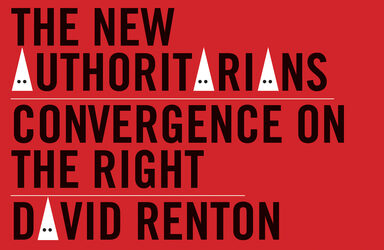Transit Books is a young press—it was founded in 2015 with the aim of bringing an open-minded and international sensibility to an industry that is notorious for its insularity and resistance to the unknown. The risk of starting a new business and choosing to focus on the areas that conventional wisdom describes as the most challenging (translations, novellas, literary and narrative nonfiction) paid off for Transit Books. The fiction and nonfiction that they publish all display a powerful intimacy that perhaps is one explanation for their unlikely successes. One of their first books, Swallowing Mercury by Wioletta Greg, was longlisted for the Man Booker Prize, and several others had prominent critical acclaim and sales success.
On New Authoritarianism and its Historical Ontology
David Renton, The New Authoritarians: Convergence on the Right, Chicago, Haymarket Books, 2019, $10.84 USD.
Broadly speaking, there are a group of political scientists and historians making the case that we may be experiencing a newfound convergence between what were formerly starkly different authoritarian and democratic national forms of governance.[1] In The New Authoritarians: Convergence on the Right, David Renton weaves a scenography of mainstream conservatism’s lapse, wherein histories of war and colonial power—particularly as it concerns global institutions such as the United Nations, the IMF or World Bank—allowed for the uptake of far right politics beyond the West’s own borders. The victories of Donald Trump in the US and Boris Johnson in the UK have boosted not only an already confident right but a fringe ideology within it. From General Sisi in Egypt and Jair Bolsonaro in Brazil to Rodrigo Duterte in the Philippines and Recep Erdoğan in Turkey, we are privy to growing far-right patriotism, where right-wing parties have radicalized and then normalized politics once restricted to the margins.
Continue reading “On New Authoritarianism and its Historical Ontology”
#JusticeforGeorgeFloyd
The murder of George Floyd at the hands of the Minneapolis Police Department last week has galvanized the American public. What distinguishes this catalytic event from the long history of the racist murder of persons of color by the police is not that it is extraordinary, but that it has taken place during a pandemic and in the midst of public outcry surrounding the murders of Ahmaud Arbery and Breonna Taylor, and racist incidents in Central Park. These moments make horrifically clear the everydayness of white supremacy as well as the systemic and individual ways whiteness is used as a weapon against persons of color. Organizers and activists have been working for decades to theorize systemic racist violence and ways to dismantle the police and carceral state. Our direct and remote participation is required to abolish white supremacy.
We have gathered the accompanying list of links that address the exigencies of the present moment from a range of concrete and practical perspectives. You’ll find information here that will point you to forms of anti-racist response, including organizations to support, ways to promote local political reform, and resources for educating yourself and others. We further encourage you to engage with your local grassroots organizations and to get involved to best serve the needs of your own communities.
Continue reading “#JusticeforGeorgeFloyd”
A Note on Present Circumstances
We had begun developing Ramparts in the fall of 2019, before the COVID-19 global pandemic began, much less entered our collective consciousness and fundamentally changed the way we live, work, and relate to one another.
Our original intentions for this platform, to offer a space for reflection and for more informal and varied writing than what we publish in our annual journal of translations, remain the same; but as the virtual world has increasingly become a primary site of communion, collaboration, and organizing, we wish to keep pace and our mission relevant.
Given the glut of takes on the pandemic–good, bad, and otherwise–that are currently in circulation, we’ve decided to only weigh in on it directly when we feel we have something unique or particularly important to contribute. Otherwise, our plan is to stick to, as it were, regularly scheduled programming.
With wishes of good health and safety, welcome to the forum.
Ramparts: An Introduction
We believe that power functions in part by controlling the movement of information.
In a moment like the one we find ourselves in, when fascistic rhetoric and actions persist at the highest levels of governments around the world, the situation on the ground shifts rapidly. A print journal like Barricade, with both the care put into production and the material demands of publishing, is not always equipped to respond with the speed the moment demands of us.
A barricade is a makeshift form of opposition.
With that in mind, we offer you, our readers, another makeshift form, our new forum that we christen here as “Ramparts”. In this democratized form, we hope to bring you biweekly offerings taking a variety of shapes in a variety of registers, from book, film, and press reviews, to translations of blog posts and news articles, to interviews, editorials, antifascist playlists, and everything in between. This forum will allow us to further probe the sorts of questions the texts we publish raise, to give space to reflect on and respond to those texts, and to explore new developments in the sociopolitical landscape as they arise.
Ramparts is a forum for the publication of writing against fascism and authoritarianism and other forms of domination and control.
A forum is fundamentally a conversation. And ours is a conversation we invite you to join. We are interested in publishing reader contributions of any of the sorts of texts we’ve mentioned, as well as any others fitting our mission, but that we’ve not yet thought of or listed. To submit to the forum, email submissions@barricadejournal.org, and check our submissions page for further guidelines.
As with the journal, everything published on the blog falls under the Creative Commons license Attribution-NonCommercial-NoDerivatives, which means the texts may be shared, but only for non-commercial purposes and only with proper attribution to the author and translator.


